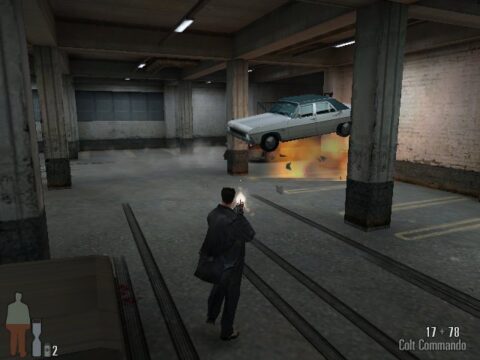
Max Payne
Written by: Rik
Date posted: August 8, 2007
- Genre: Action
- Developed by: Remedy
- Published by: Take 2
- Year released: 2001
- Our score: 9
Some time in 1994, in the midst of all the PR hype befitting a game that cost $4 million to make, Chris Roberts declared his latest epic to be the first ‘interactive movie’. ‘After playing this game for 30 minutes’, he said of Wing Commander 3, ‘you’ll think to yourself, “Wow! I’m playing a movie”‘. In a way he had a point, in that the standard of the acting and production was a cut above the usual guff usually bearing that dreaded tag, and, of course, there were actually some bits you could play, which always helps. But I don’t think too many people agreed with his claim that WC3 was really like ‘playing a movie’: enjoyable as it all is, it’s still more like watching a bit of a movie, then playing a bit of a game, then watching a bit more of a movie (and so on). Of course, pretty soon after this, the realisation dawned that putting lots of video bits in games wasn’t actually the future of gaming, and as a result, people by and large stopped doing it, and the phrase ‘interactive movie’ was destined to never be used on the back of a game box again.
While games continue to be influenced by Hollywood, few have done so as heavily as Max Payne, which not only references virtually every decent action film ever released (as well as few not-so-decent ones) but also replicates the breathless pace of these movies by keeping the carnage coming and distractions to a minimum. It’s a relentless frenzy of bullets, blood and explosions, only ever pausing to load the next level or feed you a small chunk of story. Put simply, playing Max Payne is like playing your very own action movie, and if it hadn’t been for the fact that doing so would have been the kiss of death for their sales figures, it would have been perfectly legitimate for them to stamp ‘interactive movie’ all over this game.
As its core, Max Payne is a relatively straightforward shooter. While the third-person perspective may suggest Tomb Raider-style platforming, very little leaping and grabbing is required, bar the occasional stiff-legged jump, and gunplay is largely the order of the day. The action most closely resembles that of a fairly typical FPS, with endless numbers of faceless bad guys coming at you from all angles, and the only way to progress is to blow them away using increasingly more powerful guns.
Before getting into the game proper, there’s a bit of back-story to catch up on. You play the eponymous Max, a cop on the edge who lost his family to a gang of murderous junkies and gets into more then he bargained for when he goes undercover to find out who’s behind it all. We first join him at the end of the game, standing atop a New York skyscraper, with police sirens screaming below and his impressively gravelly voice mumbling darkly about bullets and dead bodies. Clearly, he’s been through a lot, but to make sense of it all you have to go back three years, back to the night the pain started…
Sorry, drifted off into Payne-speak there. Perhaps I should explain; the story is driven by series of ‘graphic novel’ screens, which appear at the start of each level and at each plot-relevant stage throughout the game. As a storytelling device, it’s a novel (ho-ho!) approach; not only do the frames themselves, utilising a combination of hand-drawn backdrops and actors, look fantastic, but they’re also a good way of slowing down the action a little and letting you take in some story, a little atmosphere, and the considerable ramblings of a cop with nothing to lose. So, without giving too much away, the nature of the plot dictates that much of your time is spent listening to Max’s own soliloquies.
Just as well, then, that a) the script is pretty damn good, and b) as we’ve already mentioned, Max is the kind of gravelly-voiced hero that pasty nerds can get on board with. His narrative, though effectively a homogenisation of all manner of action and thriller movie clichés, is no less impressive for it, and the manner of delivery is flawless. The same could also be said of the story itself – while it’s nothing startlingly original, it’s also extremely well done. As we’ve already mentioned, the game tips its hat to a number of Hollywood movies, with a large skyscraper chock full o’ bad guys (Die Hard), shadowy agents in suits (The Matrix), and the Mafia (every film to ever feature I-talian American gangsters, from The Godfather to Mickey Blue Eyes) all popping up at various stages. And while I won’t pretend to know all that much about John Woo films, the man and his work are both mentioned during the game, and a quick look at Wikipedia confirms my hazy recollection that he’s a director that likes to feature footage of people getting shot in slow motion in his films.
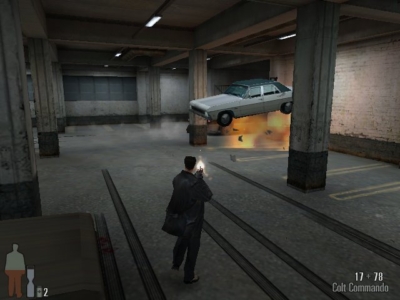
It may look like Max caused that explosion here. He hasn’t though – that’s a scripted event. I just happen to be wasting bullets at exactly the same time.
Which brings us onto Max Payne‘s gameplay. In fact, ‘people getting shot in slow motion’ sums up the vast majority of the content pretty well. The slow motion bit comes in the form of ‘bullet-time’, arguably Max Payne‘s most unique feature, which allows you to slow down the actions of those in the game world while you continue to aim your weapons in real time. Whack the right mouse button and dealing with a room full of bad guys suddenly gets a hell of a lot easier, especially when you combine the bullet-time with full-on dive (known as ‘shootdodging’), a move which you’ll need to get to grips with if you’re going to make any progress through the game. Of course, you don’t have limitless supplies of slow motion goodness, and if you run out, you’ll have to take out a few bad guys the old-fashioned way in order to top it up.
While it may sound a little gimmicky, bullet-time is anything but a superficial nicety; it’s actually the device the game uses to increase the odds of your survival, and explain how one man could possibly survive and take on so many gun-toting bad guys. In some first-person shooters, this is achieved by allowing the player to take a lot more damage than your enemies, but this isn’t the case in Max Payne; two or three well-aimed shots and you’re pretty much done for. You don’t have any armour (always a bit of a cop-out explanation in FPSs, I reckon) and you won’t be taking any rockets in the face and living to tell the tale. Though you will die a lot, you can also pull off some neat moves, and of course, take out rooms full of bad guys and come away pretty much unscathed. Oh, and in case it needs mentioning, the whole slow motion thing is pretty cool; yes, you can actually see individual bullets coming towards you, just like in The Matrix.
It’s nice graphical touches like this which mean that although Max Payne may have lost a significant amount of the ‘wow’ factor that it may have had when first released, it still has enough in its locker to impress. Gunfights are spectacular, with bullets ricocheting off nearby walls, sending debris flying everywhere, and the various flame effects and explosions on display are pretty incredible, showcased most impressively during Max’s implausible escape from a booby-trapped restaurant mid-way through the game. Admittedly, it may not have the most colourful palette in the world, but then the various murky environments on display here are at least in keeping with the noirish theme of the game.
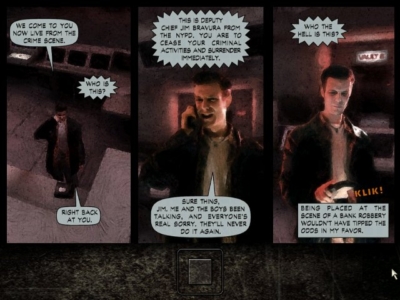
A scene from the ‘graphic novel’. And to think I got through the whole review without calling it a ‘comic’.
It’s been pretty much unequivocal praise so far, but before we go any further it’s probably worth acknowledging that not everyone feels this way about the world of Payne. Despite being widely praised on release, there exists a significant minority of Payne-haters who view it as an overrated piece of tosh. Some criticism of the gameplay is valid. For example, enemy AI is heavily reliant on scripted events; if a bad guy kills you with a grenade, there’s a pretty good chance that when you quickload and try that bit again, he’ll do almost exactly the same thing again. At other times, your foes stay stuck in one place trying to shoot at you from impossible angles rather than actually coming to try and find you. There are times when you’re innocently running around assuming that you’ve cleared the room, only to find that there’s still one dude aimlessly firing a shotgun at a nearby wall.
Other criticisms are more down to personal taste. Undoubtedly, Max Payne is a linear game, with virtually no scope for exploring the levels or pursuing different approaches to a situation. You’re herded down a set path from start to finish, and for some it’s almost inexplicable that a one-dimensional shooter released post-Deus Ex could attract a similar level of praise. My own view is that it’s all about pacing. Max Payne is an extremely high-tempo game, with the emphasis on action, leaping through a doorway and emptying a few rounds into some faceless bad guys. I’m sure that the developers could have added a few more ‘find the key’ puzzles and expanded some of the levels if they’d wanted to, but I think the linearity of the game should be viewed more as a deliberate design feature rather than a shortcoming or an oversight; it keeps the emphasis on high-octane action rather than aimlessly legging it around trying to figure out where to go next.
Apparently, Max Payne‘s story isn’t for everyone either, with some unable to tolerate Max’s dark mutterings, the noirish style of the narrative and the endless references and clichés. Others, in Max Payne‘s defence, have suggested that the whole thing borders on parody, and your levels of enjoyment are entirely dependent on whether you get the joke or not. Frankly, I don’t agree with either assessment. Certainly, Max Payne doesn’t take itself too seriously, but it could hardly be considered a pastiche. While you can allow yourself a smirk at Max’s grimly poetic ramblings, and the knowing way he describes his situation, as if he was the first cop to ever go undercover, be double-crossed and face a fight to clear his name, you’re basically meant to take the rest at face value. It’s not the sort of stuff that’s going to win too many awards; for one thing, not all of the voice-acting is quite up to the standard of Max’s own impressive delivery – but it’s still an enjoyable yarn, on a par with the kind of average thriller you mind find on midweek terrestrial TV.
Ultimately, I can’t look into my crystal ball and tell you if you’re going to enjoy Max Payne or not. What I can say is that I really did, and at no stage during the game did I ever consider that it might be the gaming equivalent of Marmite (ie you either love it or hate it). In terms of flaws, other than those of the AI described earlier, there are only a couple of minor things to mention. Sometimes the graphic novel cuts in at inopportune times, particularly before a major gunfight, and when you get back to the action you have to move pretty quickly to avoid a speedy death. If you happen to have the wrong weapon selected before the cut-scene, then tough: you’ll still be holding it afterwards and you’ll have to either waste valuable milliseconds fiddling around to change it, or you’ll have to go back before the graphic novel scene and make sure you’re all set before triggering it. It’s certainly an annoyance, albeit an intermittent one.
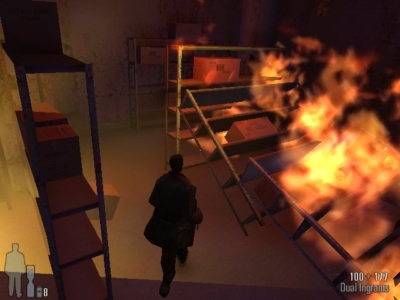
The explosions in this game are pretty impressive. This level is one big explosion with your name on it.
While it’s not necessarily a fault, it’s also worth pointing out that Max Payne is pretty short, with not much more than a week’s entertainment (and that’s assuming you work full time and don’t stay up until the early hours every night of that week) contained within. The end also comes pretty quickly because there are no bits where you get lost, because it’s such a blast to play, and because the game ‘auto-adjusts’ its difficulty (mainly in the form of weapon and health placement) depending on how you’re doing. It wants you to get to the end, and you will.
If you haven’t played Max Payne already, I highly recommend that you do so. While it doesn’t last forever, it’s one of those games that’ll keep you hunched over your keyboard, until you finish it. Time may have dimmed its visual appeal ever so slightly, but while the slow-motion shoot-out carnage still dazzles, there’s still one hell of an enjoyable game underneath. Max himself, meanwhile, is one of the all-time great videogame characters – the kind of macho man countless other developers have tried and failed to cultivate – and he wins you over almost as soon as his narrative has taken you through the first few screens of the graphic novel. Like I said earlier, there’s always the chance that you might not like Max, or his game. But if you have any interest at all in action games, you absolutely have to play this. You know, just to find out.

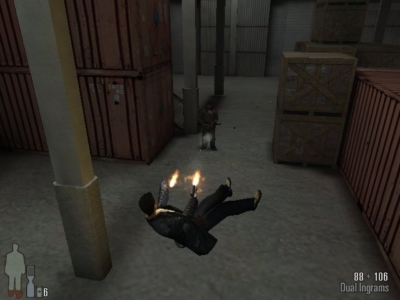

 Posts
Posts
A little late, but your acute review made me replay this game today. I hold the same opinion about it as when I discovered it aeons ago : too easy because of too poor enemy A.I., very good art direction (including the graphics novel), pleasant illusion of “realism” (the usual ordinary evil and corrupt people we learn of in the press every day, and no more than 5 or so enemies at a time), well-crafted classic “film noir” story, good controls, nice main character voice (at least for the French version), some humour. I never had to use the bullet time (the sniper bullet effect does not count), and Max’s health was too low at a few times. More than the sum of its parts. It was an A title for me, and it still is.
Thank you for inspiring me to reinstall it !
March 24, 2020 @ 12:31 am
Goddess Alea made me find this official 20th anniversary Max Payne video today :
https://www.youtube.com/watch?v=DsQVD5ttpog
Weird to see the real actor seems almost less real than photorealistic treatment. 😉
July 29, 2021 @ 8:13 pm